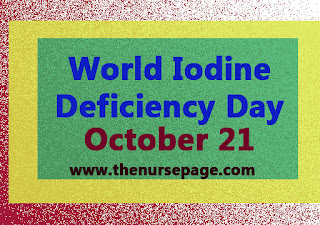World Iodine Deficiency Day, October 21
The aim behind this day is to generate awareness of the adequate use of iodine and to highlight the consequences of iodine deficiency. According to the WHO, around 54 countries are still iodine – deficient. Iodine is a micronutrient which is required for human growth and development.
Iodine deficiency is prevalent in many mountainous regions and in central Africa, central South America, and northern Asia including India. In areas of relative iodine deficiency, there is an increased prevalence of goitre(enlarged thyroid gland), and when the deficiency is severe, hypothyroidism and cretinism.
The recommended average daily intake of iodine is 150microgram per day for adults, 90 to 120 microgram per day for children and 200 micrograms per day for pregnant women. Urinary iodine is >10 microgram/dL in iodine-sufficient populations.
Deficiency of iodine may cause the following disorders:
- Enlargement of the thyroid gland
- Mental illness: subnormal intelligence, mental retardation, impaired cognitive development in children, brain damage
- neuromuscular weakness and spasticity (muscle stiffness)
- Endemic cretinism (stunted physical and mental growth)
- Stillbirth and Spontaneous abortion in pregnant women
- Congenital abnormalities such as deaf-mutism (inability to speak) and dwarfism.
- A defect in vision, hearing, and speech
The commonest source of iodine is salt. However, it can also be found in other foods such as:
- Milk
- Eggs
- Seaweed
- Shellfish
- Sea fish
- Seafood
- Meat
- Cereal Grains
